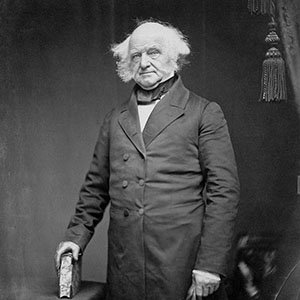Martin Van Buren served as Vice President to Andrew Jackson (1833-1837) and as the eighth President of the United States (1837-1841).
Early Life
Martin Van Buren was born on December 5th, 1782 in Kinderhook, New York. Born to parents of Dutch descent, Van Buren was the first president without British ancestors. Van Buren was exposed to politics from an early age, as his father operated a tavern often frequented by politicians traveling between New York City and Albany. This exposure likely played a role in his decision to pursue a political career, which began when he became a county official shortly after being admitted to the bar.
Early Career
In 1812, Van Buren was elected to the New York State Senate where he served for two terms. As a state senator, he actively sought to develop New York’s Democratic-Republican party. Then, in 1821, Van Buren was elected to the United States Senate. Van Buren, who firmly believed that the federal government should not interfere with states’ rights, voiced support for Andrew Jackson, who shared the same views. Van Buren also played a crucial role in forming the Democratic party, as he was one of the leading voices opposing John Quincy Adams’ position as president.
After Andrew Jackson won the presidential election, Van Buren was appointed as his Secretary of State. The two proceeded to establish a close relationship. The relationship Van Buren built with Jackson proved worthwhile for him, as Van Buren served as Jackson’s vice president during his second term of presidency.
Presidency
In 1836, Martin Van Buren was elected to become the eighth President of the United States. His biggest challenge during his presidency was leading the nation through the Panic of 1837. In response to the panic, Van Buren proposed that federal funds be deposited in an independent treasury rather than state banks. This proposal, however, sparked criticism from those who believed a national bank was required to overcome the poor state of the economy. Resistance to the proposal lasted for three years. When Van Buren’s proposal for an independent treasury finally passed in 1840, the economic panic transitioned into a depression. Van Buren’s response to the panic caused many to question his leadership.
Van Buren was also criticized for his policies towards Native Americans. As president, Van Buren furthered Jackson’s policy of removing Native Americans from their lands. In 1838, Cherokee Indians were ordered removed from their land, which led to a quarter of the Cherokee Indians losing their lives. Van Buren also faced a conflict with the Seminole Indians in Florida who resisted removal. These resistance efforts resulted in the deaths of thousands of Indians, which sparked criticism of Van Buren and his administration.
Death
Martin Van Buren died in 1862 when he was seventy-nine years old.








